Batman alums Scott Snyder and Tony Daniel create a trucker-centric sci-fi drama in Nocterra
Big rigs, dark forces, and real-life lessons: Snyder & Daniel hit the road with Nocterra
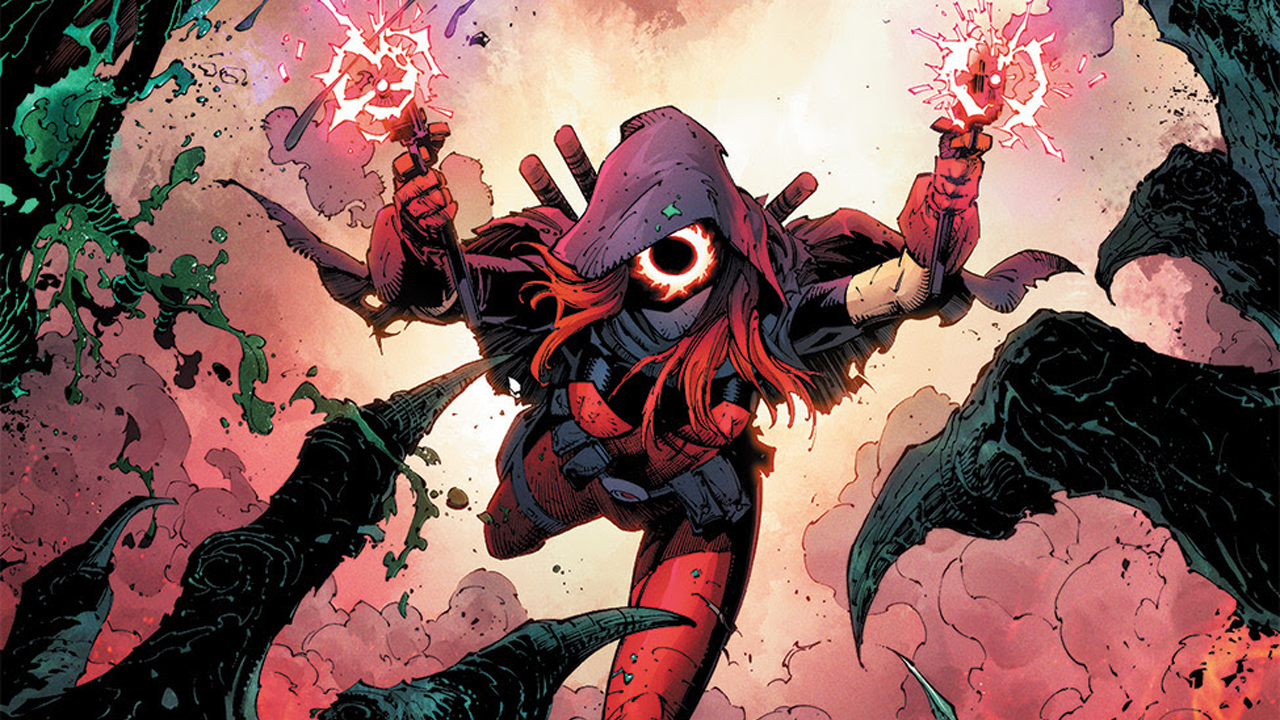
Darkness has enveloped the globe. Citizens of the world are more divided than ever. People are transforming into monsters. If that sounds like the world we're living in, well then, writer Scott Snyder has done the job he set out to do: to write about our present moment in history and translating it into fiction.
However, the world Snyder writes about in his upcoming series Nocterra is decidedly not ours, though the themes may be the same.
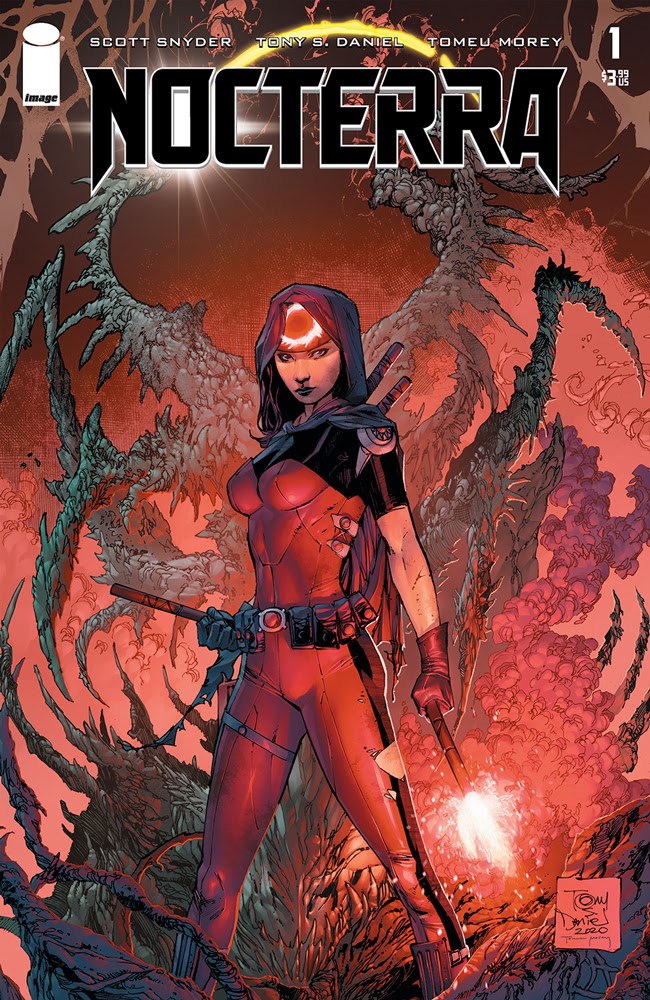
In Nocterra, a global event called 'The P.M.' has literally cut the sun off from the Earth, leaving out planet covered in mysterious darkness. What's worse is that this darkness physically alters living beings that stay in it too long, turning plants, animals, and even humans into monstrous beings called 'Shades.' Surviving in this world is Val Riggs, a 'ferryman' who transports people and things between human outposts in a tricked-out, well-lit 18-wheeler. Val has gotten used to a life of post-apocalyptic road trips, but an encounter with someone willing to pay handsomely to be transported across the country may cast her situation, and the whole world, in a new light.
Er, dark.
Creating Nocterra along with Snyder is long-time DC ally Tony S. Daniel. Together, the pair set up a Nocterra Kickstarter to get the comic going and were met with raucous support. Now, Image Comics has decided to publish the book, which will be the first in Snyder's line of creator-owned projects he's calling Best Jackett Press.
Ahead of the book's debut, Newsarama got to chat with Snyder about Nocterra, its origins, and how it fits in with the rest of Best Jackett Press.
Newsarama: Scott, my first question about Nocterra is just this: Why big rigs?
Comic deals, prizes and latest news
Get the best comic news, insights, opinions, analysis and more!

Scott Snyder: This is a personal series for me. It's about this darkness that separates us all and makes us all unrecognizable to one another, changes us into things that we suddenly don't see as ourselves anymore. It has a subtext that I'm very passionate about. It's the kinds of things I stay up to talk to my kids about, you know, the state of the world today.
But I think part of the fun of it is making sure that it feels high-octane and bombastic, and for me I've always wanted to write something about that kind of high-speed on the highway, non-stop, don't take your foot off the gas sort of story. It married those two things in kind of a perfect way.
On the one hand, the context in the world and its mythology is very personal to me, especially when it comes to being a dad, how I introduce my kids to some of the topics that are on my mind in the most general and broad way, translated into this comic book bombast.
But the fun of it, for me, is being on the road constantly with these characters and having the sense of this culture of transience. The whole book is really about overcoming that darkness (that separates us and makes us unrecognizable to one another) through connection. Through finding each other in the dark. I felt that trucking was a good metaphor for that. These characters ferry people from place to place and they're separated. The book is about banding together and finding each other in the dark. Accepting the challenge of finding our way through this mysterious night that's fallen over the Earth and finding a better place. That's sort of the compass of the book itself.
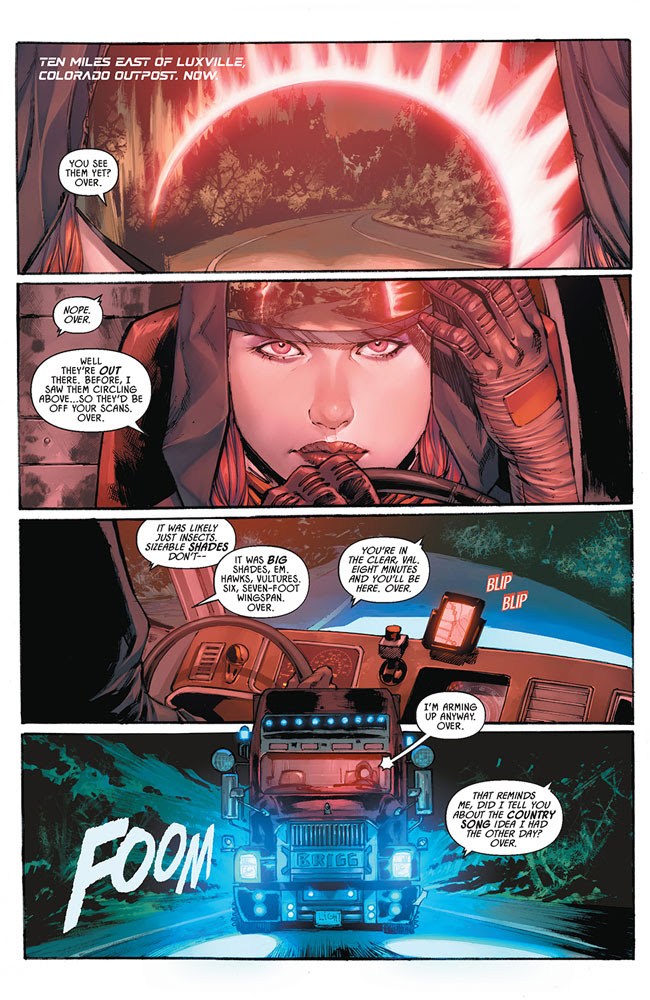
Plus, I get to make up a lot of really cool call signs, which was awesome. With every character, Tony and I go back and forth and go, 'What's their call sign?' It's just fun. It has a level of fun to it that we really wanted this book to embrace.
Nrama: You talk about introducing the themes of this different world. Nocterra is set in a familiar world, but there's so much new going on. There are the Shades, there's the P.M., all these things. How do you, as a writer, introduce readers to this different world in a way that feels authentic?
Snyder: It's a challenge, especially when I do a lot of different kinds of writing. There's a whole slate of books for Best Jackett that I'm working on now that we're going to announce later in the spring. It's varied stuff. Some of it is literary fiction, some of it is thriller, or noir, or sci-fi. But for this book, for the first one with Tony, I wanted to really do something that was kind of Spielberg-ian and right up the middle; big-hearted, big-fisted-heavy engines.
I wanted to take all the things that I've learned in a superhero world and apply them to something that's personal and my own. It was a challenge to be able to introduce this whole mythology, get the story rolling at a fast pace, make sure it's character-driven, all of that stuff in one place. But the goal was to not use any tricks.
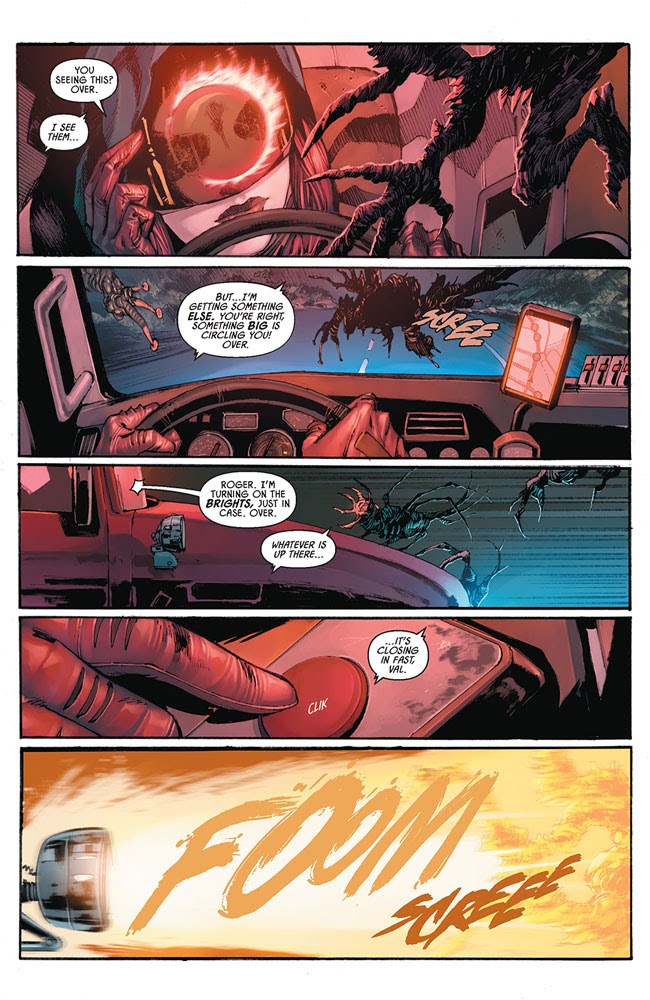
My hope was that what I could do with this issue will show you that, without any kind of sleight of hand, without any of the things I teach to do when you're trying to impress - you know, flare and razzle-dazzle - just none of that. I wanted to do just straight storytelling; sincere, earnest character-building and plot-building, and conflict-building. It's really conventional but my goal was to do it in a way that shows if you put your heart in a story and make it sincere, it activates. Everything comes to life.
There are a lot of ways that I could have done it, and I thought about them all. I thought, 'I could do a mile ticker,' or 'I could tell it from the back to the front.' All these tricks I learned over the years to make it flashier. But I thought, 'No. Tony's art is so sincere and earnest. It's muscular, it's dynamic, it's emotional. Don't skimp on that. Just go right for it. Just let it all be hard on the high-octane horror.'
I was moving through writing it methodically, asking, 'How do I make each scene nuanced enough and earnest enough and good enough that you'll keep reading, even though it's not a book that kind of defies expectation?'
It kind of embraces expectation. And then it elevates the experience of reading it just to equality. On the entire team's part.
Nrama: You do definitely get that sense that it's got its heart on its sleeve as you're reading it. That's especially true with the main character, Val Rigg, who I want to talk about. First of all, that name had to be intentional, right?
Snyder: My neighbors that helped us out with the trailer and the Kickstarter, their last name is actually Riggs. I already wanted to name her something that has a connection to trucks, so we liked the name 'Val Riggs.' One of the great things about that character is that, when Tony and I were talking about her, we said we wanted to make her somebody that had an archetypal quality and had a fun design. We wanted something that fans could embrace, a visual flair that gave her a look that would be singular. But we also wanted to invest her with things that we felt were personal to us.
Tony wanted to bring in some of his background to her background culturally, I wanted to bring in a sense of fear of the dark and having spent some time in this place of anxiety about darkness. So she's someone we really built together. I can't say enough good things about Tony as a partner. He's a triple threat! He is a great artist, he's a great storyteller, and he's a great editor. Working with him is working with someone who brings more to the table than I do, and it is a fantastic experience.
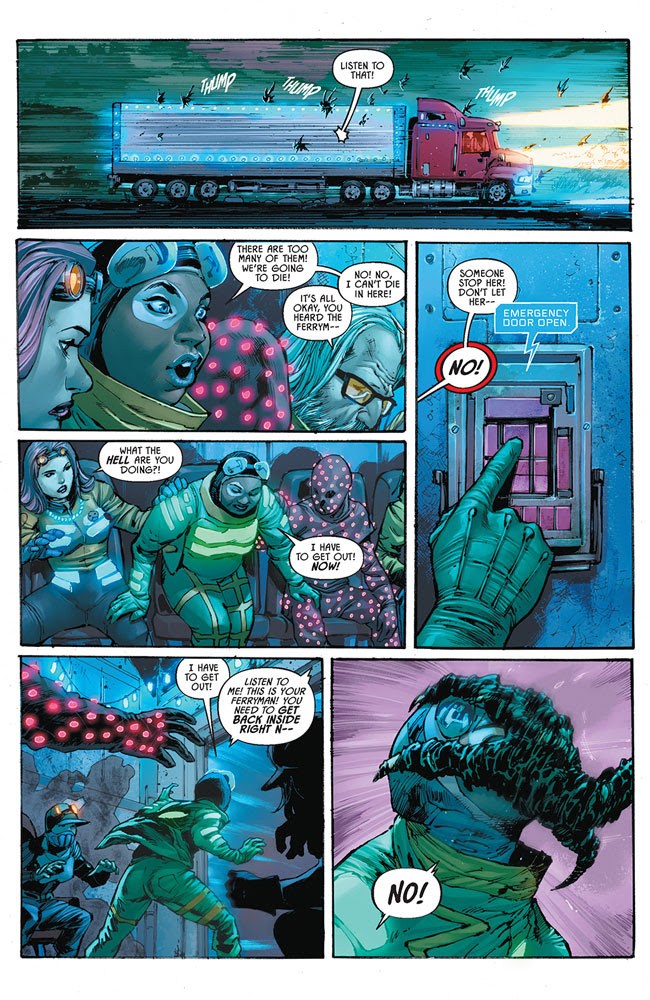
We became friends long ago. It was all the way back when 'The New 52' started and we were talking about what to do with the Joker. They went back and forth, you know, they wanted us to kill him or lobotomize him. And together, Tony and I came up with that idea of taking his face off. Tony said, "If I do that you're going to have to pick that up." And I said, "I promise I have a story in a year. I'll do it."
So we really bonded back then and he gave me a lot of pointers as someone who was already an industry veteran. I was a new guy back then. So we've been looking to do something together for a while. We really wanted to be 100% collaborative. I feel really good about that. We tried to be transparent with the Kickstarter about our collaborative process.
If you ordered the Kickstarter, you'll get that extended book and see what I mean. You'll see how different the first script was. You'll see how the final script changed in a way as I adjusted to his art to tried and react to it, to make the book more nimble and more organic. I think it's much better in its final form for that collaboration, and I'm very thankful for Tony for being my partner and my friend.
Nrama: Is that a frequent occurrence for you? I mean, that you have a script that molds as the art takes it over?
Snyder: Yeah! That's why we wanted to do the Kickstarter in the first place. I've never given away my scripts. DC has sometimes published them as 'director's cuts,' which was out of my hands when I was starting out. The reason I don't usually publish them is that I feel like it gives a false sense of a template, that there's a particular way is I write a script for an artist.
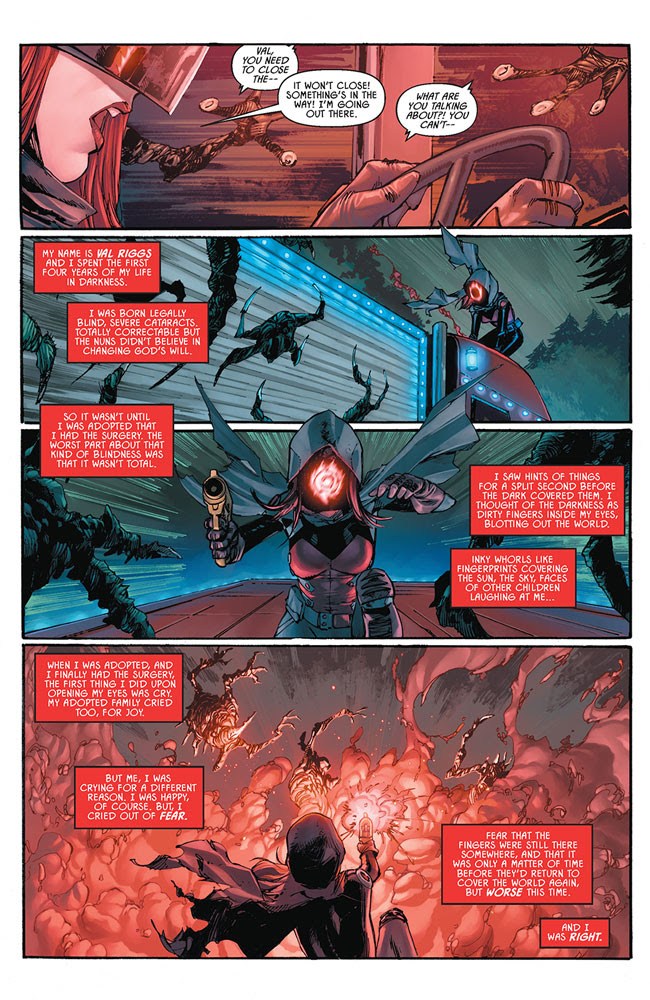
There was this one thing that I learned from Greg Capullo when we were doing Batman together in our first year, which I honestly consider the most valuable lesson in my comics career. That is that, as a writer, you should adjust your style to meet what's going to bring the best out of your artist. Some artists you work with like really loose scripts.
For example, Greg likes a seven-page script for like a 30-page issue. So I will write one in my own way, as a 20-page script, and then I kind of unwrite it. I put it back together as a seven-page script for him. For somebody like Raphael [Albuquerque] or Jim Cheung, they love full scripts, so I'll go full script for that. All that to say, I never wanted to publish a script because I felt like it would be something that would deceive readers into believing 'this is how you do it.' But the point of writing comics is that there is no template. It's always a relationship between you and your artist.
But with this book, it was fun to show that process from step one to the final product, to be able to say, 'Hey, if you want to see the way we began, here's the Kickstarter. Now you have a special edition. Now you have the finished product and you see the development process.' You can see my thinking based on the art, and how I changed everything to meet the great storytelling that Tony did visually. I feel very strongly about that.
The first thing I would advise a new writer out there is that they try and talk to their artists. Ask, 'How do you like to work? Do you like to work with a full script? Do you like to work off an outline? Do you like to work over the phone?'
Actually, right before I got on this phone call with you, Greg Capullo called me and talked about an issue we're doing. He was like, "What do you think our characters should do in this scene?" We brainstorm all the time. And sometimes he'll just go do it. Sometimes I just don't have to write a script for a page or two. And that's our method.

My point is simply; Nocterra is a very organic collaborative experience. From Val's creation to the monsters' creation, all of it. I hope and I feel that it is a stronger book for that. I hope that's apparent as you read it; that this is a passion project for both of us.
Nrama: It absolutely is. In the character designs, especially, I saw that connection between writer and artist. I thought to myself, why are they all dressed in rave clothing? You know, wearing glowsticks and stuff. And then I realized, "Oh, it's because they can't be in the dark too long!"
Now, I do want to keep talking about what you are putting into this book personally, but first, why the name change? From Nocturnal, as it was originally known, to Nocterra?
Snyder: That was just legal. There's a book series that's great; it's called Nocturnals. There was a worry on legal's part that if you Googled the name, the wrong thing could pop up. I'll tell you very adamantly: if anyone is out there wanting to do a book about anything night-related, every single name is taken by a YA vampire romance of some kind or the other. There is every permutation. They've all been taken as vampire books about kids. So beware.
But, in all seriousness, we lucked out. Nocterra is a title that I like a lot better because I feel like it speaks to us more about an Earth that is enveloped by a mysterious darkness. But yeah, that was why.
Nrama: Returning to the subject of what you are putting into this personally: You were saying you work some of yourself into these characters. I read you were very afraid of the dark as a kid. What was that like for you? Were you afraid of ghosts? Killers? What was that?
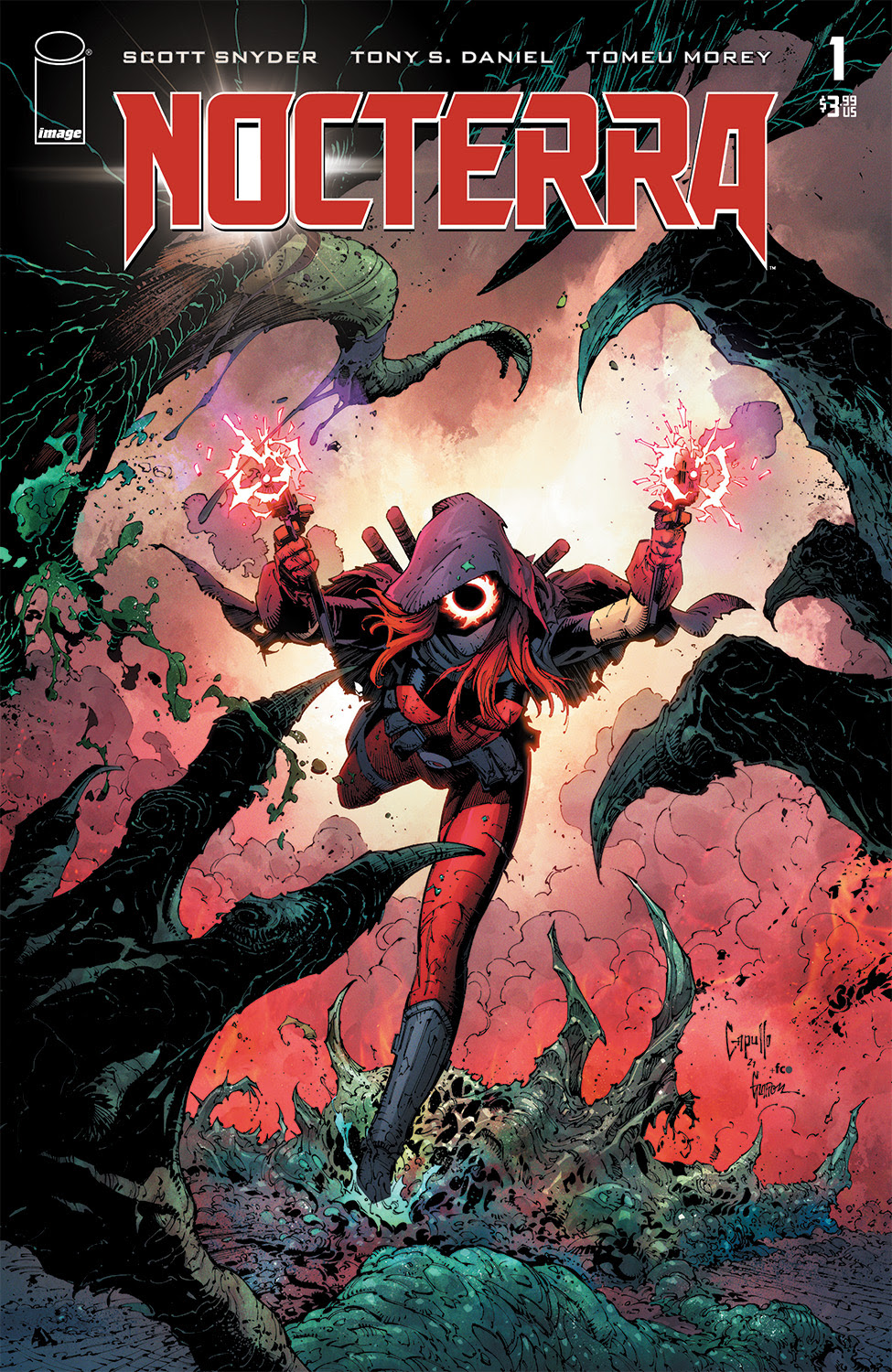
Snyder: No, it was the unknown. I've always struggled with anxiety, and the problem with anxiety is that it makes you feel like everything that you're worried might happen will happen. Your body acts as though those fears are happening, so you feel these physical panics that make you struggle to believe that the things that are irrational fears actually are irrational because your body is acting as though they are happening and urgent. The problem that I have with the dark, especially as a kid, is that every fear you have is possible. Because it's the unknown. It's the uncertain.
So for me, nothing is scarier to someone with anxiety and depression than something that you can't concretize, that unknown. Because everything that your brain is telling you is going to happen - the doomsday scenario, or the self-critique, or the punishing yourself - that stuff is real in the dark. All that stuff is what's going to happen to you and the world and the people that you care about. It was a very acute fear as a kid.
As an adult, I've learned where that fear came from and I manage that in my own way. But I have one kid in particular that reminds me tremendously of myself. A year ago, he really started struggling with this fear of the dark. He'd wake up in the middle of the night call to us just like I did with my parents. It really got me thinking I want to do a book that's about how, especially at this moment culturally, the ways in which we are isolated from each other allow our greatest fears to become material for us. They allow us to go down these silos and corkscrews of real personal terror and become almost locked in those belief systems that alienate us from one another and make us hard to rescue.
That's really where it came from. My fear of the dark was echoed in my son's. Seeing that made me really want to write this book.
Nrama: As a parent, do you often find yourself writing your books for your kids?
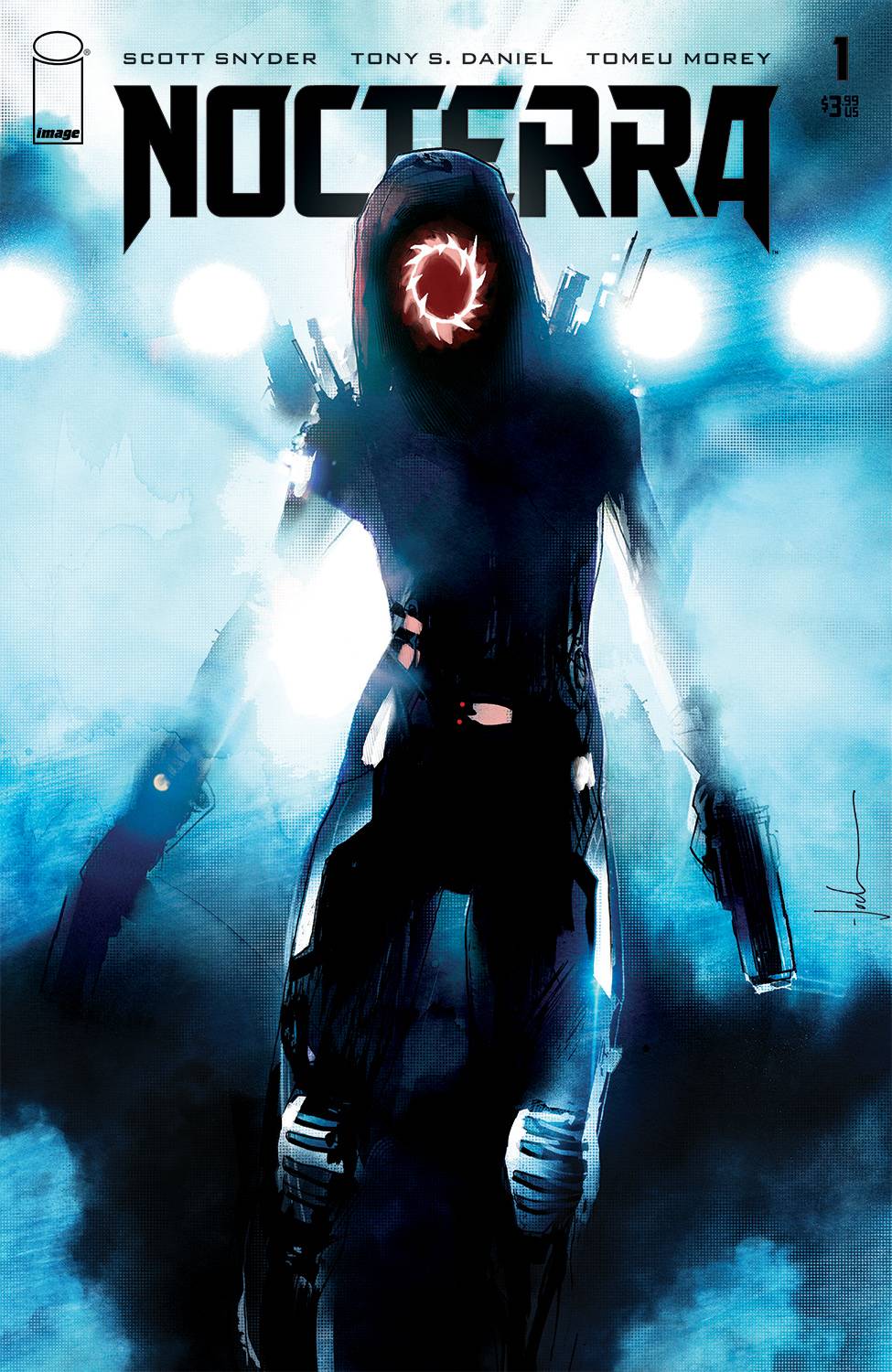
Snyder: Some of them. Some of them I'm like, "Don't ever read this until you're 18." You know, like Wytches. But this one in particular, yes. My oldest son wants to be a writer. He's turning 14 soon, so we started watching more mature material. He's into history, so we watch Saving Private Ryan. He also really wanted to watch the great horror movies, so we watched Night of the Living Dead and all this stuff. He also loves manga, anime, Fortnite - everything that bridges the gap between PG, PG-13, and Soft R.
Nocterra is very much designed as something that he could read and wouldn't be too offensive to him, but at the same time is just above his head enough to make him want to read more mature material. For me, that stuff was Batman: Year One, The Dark Knight Returns, and the Image books that came out in the '90s when I was his age, like Spawn and others. I want this book to engage that teenage, young-reader kind of fun element - it has trucks and light weapons and monsters - but then have a message that I believe in, that's important for this particular moment in history.
Nrama: To start wrapping up, Nocterra and another book called Chain are the two books that are right now on the Best Jackett website. They both deal with a breakdown of society. At the risk of kind of already knowing this answer, is there a reason that you're writing that your mind is there right now?
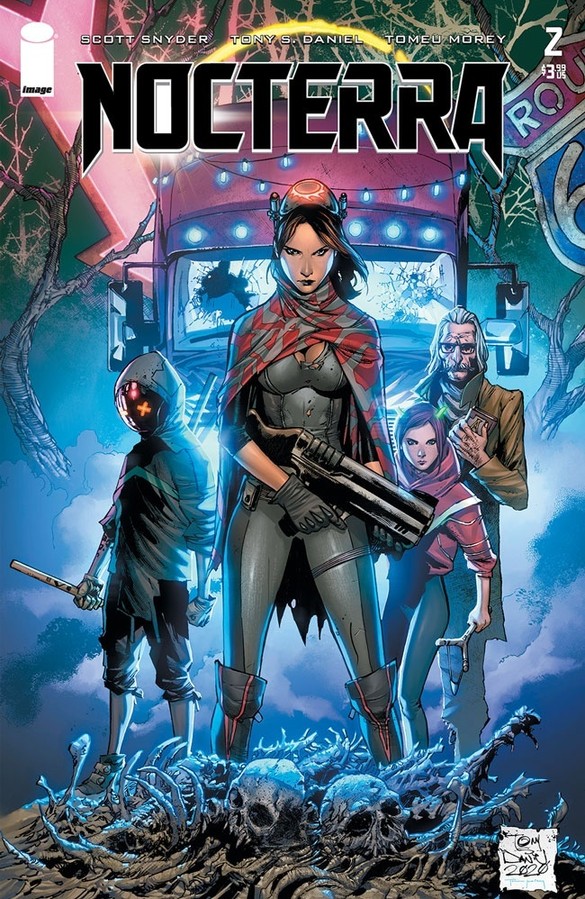
Snyder: Oh yeah. I think that part is obvious. But one of the things I'm really excited about with Best Jackett is that, though those books are both dark books, they are both really very different. Chain is the opposite of the opposite end of the spectrum as Nocterra when it comes to execution. There's no narration, it's very spacious and cold and distant. It's more like a play, really stark. But in the spring, in March, April or May, we're going to announce the whole slate. There are seven other books coming out from Best Jackett, and they're even more varied.
Those books cover a whole bunch of different bases. I'm working with people from Francis Manapul to Francesco Francavilla to Tula Lotay. I want to show a whole scope and say, "This is what Best Jackett is.” But right now, I'm trying to be very patient. What I want to do is get good material.
By spring, we'll have the first and second issues of almost all the books done. I wrote a bunch of it last year in the year before, so it's all staggered. It's not like me furiously writing a book. Some of them we signed on to do a while ago, like the one with Francis Manapul, which is called Clear. That one we've been squirreling away since Justice League. They've all been in different forms of development, but now that they're all coming to fruition my goal is to say in the spring that this is what Best Jackett is. It's this whole scope. I've written all these different books; you can pick up all these different kinds of things. It's a place where I want to show that it's about challenging yourself as the creator and as a reader, that it's important to try new things and take some risks. I'm really thrilled about how it's shaping up.
So yes, the first two books, the books that are slated with image, Nocterra, and Chain, which will come out in the fall, are darker. But in between those, you'll see books come out that are very different, that show a very different texture to the whole thing. I'm following this mantra: be the most exciting creator to yourself as possible.
Nocterra #1 goes on sale on March 3 both in comic book shops and digital platforms. If you're thinking of the latter option, make sure you're aware of the best digital comics readers for Android and iOS devices.

Grant DeArmitt is a NYC-based writer and editor who regularly contributes bylines to Newsarama. Grant is a horror aficionado, writing about the genre for Nightmare on Film Street, and has written features, reviews, and interviews for the likes of PanelxPanel and Monkeys Fighting Robots. Grant says he probably isn't a werewolf… but you can never be too careful.


